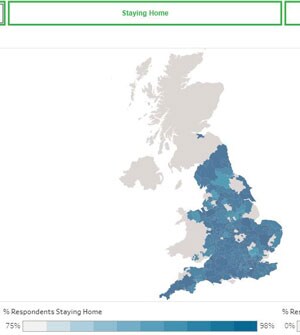Health app builders have used information about coronavirus symptoms contributed in a survey of 25,548 users to create a 'heat map' showing the progress of the pandemic across the UK, which they hope will help the NHS manage the crisis.

The map, which can trace COVID-19 symptoms against individuals' behaviour through the Evergreen Life health and lifestyle app, has already demonstrated a 5-day increase in respondents displaying COVID symptoms from 8.1% before lockdown was announced to 10.4% (March 27th).
It also indicates that 89% of people with symptoms are staying at home (compared with 53% pre- lockdown) showing that most are now acting on government advice to self-isolate.
Data scientists and researchers from the universities of Liverpool and Manchester are working with Evergreen Life to analyse the results to help the national planning and coordination effort, and to share the data with Public Health England to inform national public health measures.
Local Hotspots
The next stage, according to Evergreen CEO, Stephen Critchlow, is to increase the power of the heat map to provide alerts about localised coronavirus problem areas, to allow people to make decisions about whether to go out or not. Viewed over time, the data should also reveal how symptoms may be moving around the UK.
Stephen Critchlow says: "The power of this tool is that, as an NHS assured patient service app, we can combine the responses with other data sources. As the Evergreen Life system is linked to the person's NHS medical record, we also know that among those with symptoms, certain percentages will have underlying health conditions."
The wellbeing app is providing a data collection point for the construction of the UK crisis picture in collaboration with data experts from The University of Manchester and Liverpool University after an appeal to the 750,000 users of the app to participate in the project. Existing users already provide a representative geographical sample of the population in England.
Users of the app are being asked to report if they are self-isolating, have a dry cough or a fever. People will also be asked to report when they recover, to enable further data analysis as the outbreak progresses.
'Exciting Emerging Data Stream'
Dr Ian Hall from Manchester University, and principal modeller for Public Health England, supported the use of volunteers through the app. He said: "They are supporting a better understanding of the local experience of COVID-19 disease through sharing their data, which will be incredibly useful to national and local planning. This is an exciting emerging data stream as it provides situational awareness to users and policy makers alike."
In an NHS working to its limits, and anecdotal reports of inadequate record keeping by hard-pressed medical teams, Stephen Critchlow stressed the benefits of people having links to their own patient records though their smartphones during the current pandemic, particularly if treated in one of the large hospitals.
The system depends on GPs 'flicking a switch' to grant patient access. In the first few days of the crisis the wait for an NHS login approval exceeded their service level agreement of 2 hours.
NHS Digital has been working to reduce that delay after patients complained.
Some GP practices have opened up access to as many patients as possible, and Manchester LMC has asked all GPs to do this. Stephen Critchlow said: "We would like to appeal to all GPs to allow full patient record access for all their patients, which is now required in the new NHS GP contract."
Google Maps
Google's COVID-19 Community Mobility Reports uses anonymised information from users who have chosen to turn on their device's Location History setting and give a percentage change in levels of mobility, compared against a baseline period from 3rd January and 6th February.
The Data Science Campus has extracted anonymous data from these reports to make them publicly available so that they can be used by policymakers within government who are leading on analysis of social distancing measures.
The Government is preparing to release an app that alerts people if they come too close to someone who has tested positive for COVID-19. The contact tracking app, which will operate on an opt-in basis, will be released either just before or just after the lockdown is lifted. Key technical details are being agreed by NHSX, the NHS England innovation unit leading the project. This app needs the participation of at least 50% of the population to work effectively.



